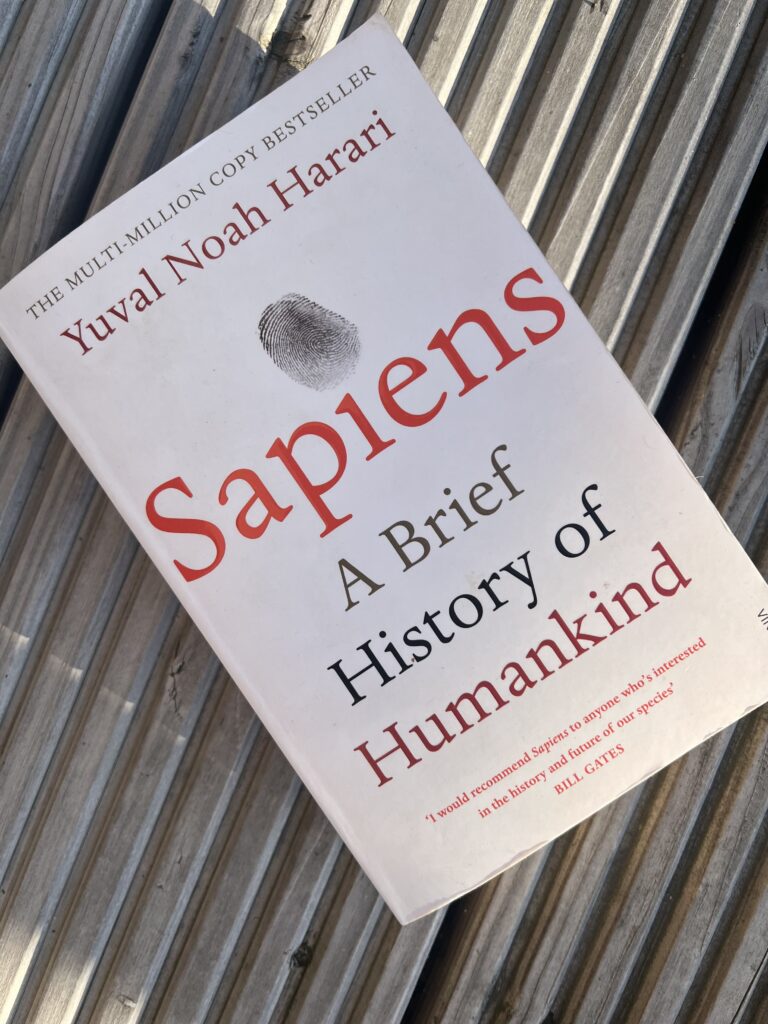“One of history’s few iron laws is that luxuries tend to become necessities and to spawn new obligations.”
― Yuval Noah Harari, Sapiens: A Brief History of Humankind
I confess I’ve been scared for a while now. Scared at the speed of change that we humans are going through. The choices we are making and the pace of technological evolution. Scared that we’re not pausing to think before we act and sooner or later we’ll flip a switch. Bringing unsurmountable and irreversible suffering and horror that we can never foresee. This fear has kept me feeling paralysed subconsciously. In a strange way, on one hand, the book Sapiens has 1) confirmed all that’s been worrying me, 2) Added to that list. On the other hand, it has comforted me ironically substantiating our insignificance in the whole scheme of things.
About the Author
“Consistency is the playground of dull minds.”
― YUVAL NOAH HARARI, SAPIENS: A BRIEF HISTORY OF HUMANKIND
Yuval Noah Harari is an Israeli historian, an author and a professor in the Department of History. He writes about cognitive revolution and has published two other books. Homo Deus: A Brief history of tomorrow and 21 Lessons for the 21st Century. Obviously on my to- read list. Harari was born and raised in Israel and was considered intellectually gifted since he was young. He has garnered both praise and criticism for his literary work and his views on cognitive revolution.
Star Rating
5 stars
Summary

History was not one of my favourite subjects in school. Not surprisingly, I’ve grown a lot interested in the subject. Sapiens is an excellent and unique summary of all of human history in a beautiful story. A wonderful combination of human evolution and all the major revolutions. The growth of human kind and its impact on the planet so far. Usually when I read a good book, I feel like I learned something. After reading this one I feel I know nothing and will be forever yearning.
What I liked about the book
“History is something that very few people have been doing while everyone else was ploughing fields and carrying water buckets.”
― YUVAL NOAH HARARI, SAPIENS: A BRIEF HISTORY OF HUMANKIND
1. The Magnitude and Dimension
Sapiens, as the name suggests is the tale of humans, its siblings and cousins going far back to more than 2 billion years. Momentarily setting the context from big bang to discussing the possibilities of our current era of AI. By giving the account of cognitive revolution, starting as an animal of no significance. Going through the process of hunting, gathering, sowing to gradually reaching the self-made / self-declared status of almost God. Humans have come a long way and have transformed planet earth in the process. Considering the magnitude of all the other possibilities that could have happened, the changes we have seen in just the past few thousand years, our (humans’) history indeed is brief.
2. Facts, Research and Unconventional insights
It’s clear from page one how much research and effort Harari has put into formulating his insights. The factual details about human as a species, the growth of human brain (as we believe). Impacts of agricultural revolution, myths we believe in and the future we are heading towards. It shows the amount of research gone into study each of these aspects. What’s amazing is the insights that come from all this. It’s quite different from how it’s been represented by other historians. Religion, civilisation, the link between science and empire. What made some regions successful than others in certain time periods is, in a way enlightening
3. Storytelling
“We did not domesticate wheat. It domesticated us.”
― YUVAL NOAH HARARI, SAPIENS: A BRIEF HISTORY OF HUMANKIND
I can say from personal experience, history can be very boring if you are merely quoting facts, dates and time periods. Conversely it can be exceedingly interesting if you see the stories in those time periods. When you see what the life was, how a normal day looked like.What people thought, what was important to them. It becomes an extraordinary experience in itself. The facts you uncover about the way of life. How something that seems unimaginable today could have been a law accepted by everyone. Harari has done an unprecedented and phenomenal job of telling a story about the whole length of time known to human being.
What some critics say
Naturally, Sapiens has received praise and accolades globally. Wildly popular and worthy of quotes from leaders of every walk of life, Sapiens has garnered criticism as well. Some anthropologists and science journalist claim that the book is not always based on facts. A few say, Harari’s predictions about the future may not turn out to be true. Two quotes from evolutionary anthropologist Avi. Tuschman seem contradictory – “Fussier worldview hobbled by political correctness” nonetheless “Harari’s book is important reading for serious-minded, self -reflective sapiens”
Final thoughts
“A meaningful life can be extremely satisfying even in the midst of hardship, whereas a meaningless life is a terrible ordeal no matter how comfortable it is.”
― YUVAL NOAH HARARI, SAPIENS: A BRIEF HISTORY OF HUMANKIND
A combination of praise and criticism in my opinion is a good sign for a book that provokes you to think. I would say the following as my final word about Sapiens – Fascinating, thought provoking, brilliant, gives a sense of perspective, thrilling and an unconventional view on history. A must read for everyone. Visit Books for more book reviews.
Until next week. Ciao!




